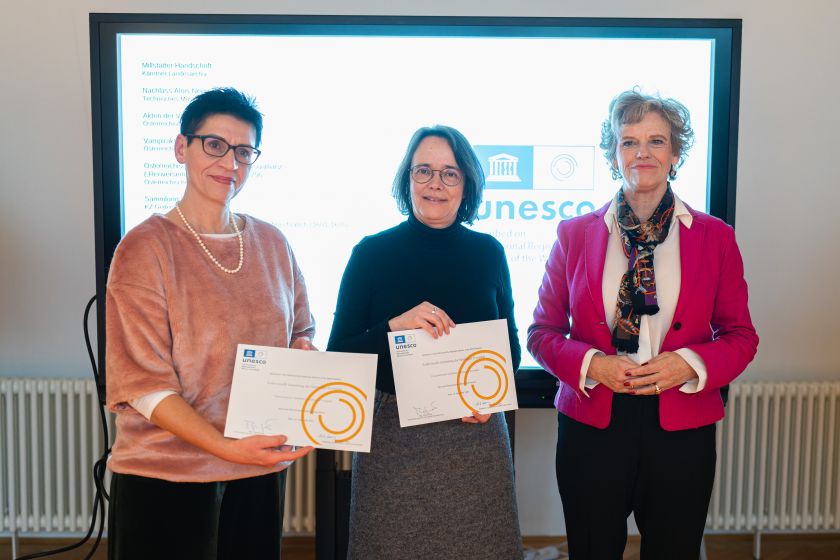The Salzburg Festival’s Audio-Visual Collection in the National Austrian “Memory of the World” Registry
The Salzburg Festival’s Audio-Visual Collection has been included in the National Austrian “Memory of the World” Registry by the UNESCO Commission

30 years ago, in 1992, UNESCO founded the programme “Memory of the World”, which aims to support worldwide efforts to preserve documents and accessibility of information. Since 2014 the Austrian UNESCO Commission has maintained the National Austrian Documentary Heritage Registry, which lists documents and collections of documents of outstanding importance for Austrian history.
The Salzburg Festival maintains an archive of recordings covering more than 80 years of Festival history, an archive which has grown over decades. This treasure, documenting unique highlights of European music and theatre history, has been catalogued since 2020 in collaboration with the Austrian Media Library of the Vienna Museum of Science and Technology, professionally digitized by the Media Library and secured for posterity, thereby also ensuring long-term access to the collection.
“This cooperation was a precious mutual gift between the Salzburg Festival and the Austrian Media Library for the centenary of the Festival and the 60-year anniversary of the Media Library in 2020: by digitizing the Festival’s in-house recordings, important productions were saved from oblivion. In this process, the Media Library plays an important role as the keeper of Austria’s cultural heritage. The fact that the Austrian UNESCO Commission has now included the extraordinary documentation of Festival history in the National ‘Memory of the World’ Registry fills us with gratitude, and also spurs us on to discover further treasures in the Festival archives and make them more readily accessible,” says Margarethe Lasinger, Director of Dramaturgy, Publications & Archives at the Salzburg Festival.
The official reason for inclusion in the 2022 National Austrian “Memory of the World” Registry:
“Founded in 1920, the Salzburg Festival is considered one of the world’s most important festivals of classical music, opera and drama. The collection of audio and video recordings from the Salzburg Festival archives covers a period from the 1930s to our present times; the main body of recordings begins in the 1980s. Originally, the recordings were meant only for archival use by the Salzburg Festival. The continuous documentary activities of the Salzburg Festival archives have produced a unique collection of audio and video documentation of the Festival’s history, including highlights of European music and theatre history. Performances were documented alongside rehearsals, thereby giving insights into artistic creative processes. The documents, more than 1,000 in total, include original recordings of the most famous conductors of their times, such as Herbert von Karajan, Seiji Ozawa, Karl Böhm, Claudio Abbado and Riccardo Muti, as well as major productions by great directors from several decades, such as Ernst Haeusserman, Peter Stein, George Tabori and Hans Neuenfels. The collection also includes a multitude of works by historical and contemporary playwrights, from William Shakespeare to Hugo von Hofmannsthal and Peter Handke.”
Foto: v.l.: Mag. Margarethe Lasinger, Leiterin Dramaturgie, Publikationen & Archiv; Dr. Gabriele Fröschl, Leiterin der Österreichischen Mediathek; Dr. Sabine Haag, Präsidentin der Österreichischen UNESCO-Kommission anlässlich der Veranstaltung im Österreichischen Staatsarchiv, Abteilung Haus-, Hof- und Staatsarchiv, Minoritenplatz, Wien
